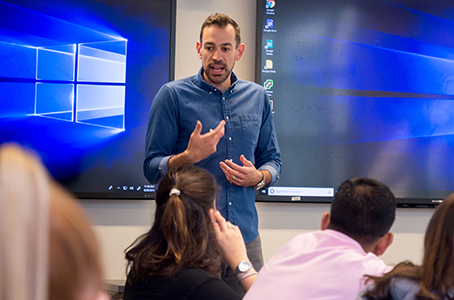For iSchool alum, and recent HINDSignts speaker, Menotti Minutillo ’07, success is measured by personal happiness. But as an engineering manager at Uber, who has previously held roles at Twitter and Goldman Sachs, it is evident his success reaches farther than self-validation.
So how did he go from a ten-year-old tinkering around with his uncle’s old computer, to an iSchool student, to a successful manager? For Minutillo it is all about pushing himself to learn everything he can, even if it is not his job to do so.
Minutillo chose the iSchool because he was drawn to technology but didn’t want to just focus on computer science. He had other interests as well, like management, and the iSchool was the best program that granted him diversity in his education.
Once he found himself at Syracuse, Minutillo said he “tried to make his degree as technical as possible.” One of the perks of the iSchool is the leeway in the elective classes you can take. Minutillo said some students chose to take electives they would be good at just to secure top GPAs. For him, however, it was always critical to take the hard, technical classes.
“Don’t be a resume robot, load those technical classes,” Minutillo said. “Use this flexibility to really help yourself. Just having the technical vocabulary can make a world of difference.”
Minutillo said many of his iSchool classes proved useful, yet the one he remembers and thanks the most is the infamous public speaking class. For Minutillo, this class was the cornerstone to his success throughout his four years at SU and into his career.
“You can improve solo work on your own. But presenting to and dealing with different types of people, and different work styles of people, this is so important to learn early on,” he said.

Menotti Minutillo ’07 speaks with students in Professor Bruce Kingma’s Senior Capstone class.
After graduating in 2007, Minutillo took a full-time engineering job at Goldman Sachs, a role he secured after a summer internship before his senior year. Although he never intended to work in finance — and he admits the hours were grueling — Minutillo said he would not trade his five years there because of the vast amount of training they offered. He also said having a big name on your resume can really push your name through the door at other companies.
“When evaluating where you want to end up, it is a highly personal choice. But if you have offers from a big company or a cool startup, I would advise folks to not knock out the ‘boring’ opportunity immediately because those big names really have a lot of clout in the business world.”
At Goldman Sachs, Minutillo would hop onto jobs he wasn’t necessarily tasked with just to learn more about the industry. This tenacious attitude allowed him to help lead a budgeting project that would ultimately be his selling point when applying to his job at Twitter.
When he was ready to leave Goldman Sachs, Minutillo started thinking about which products he valued the most in his life and identified Twitter as a company he would want to work at. After looking at job postings he found ‘technical program manager’ to be something he might have a shot at. Although his previous role did not exactly line up with the job description, Minutillo felt he could convince them he would be able to do the job by addressing his weaknesses head-on.
“Here is an interview tip, know what your weaknesses are in your background and try to get ahead of them,” he said. “You know they are going to ask you about them so if you have a solution or at least start to think of a solution for your weaknesses, the people hiring will value that.”
After his first meeting as a Twitter employee, Minutillo said it was apparent he would yet again have to take his education into his own hands — he spent the majority of the meeting pretending he knew what was going on.
So he read up. He made himself the best employee possible, something he believes is driven by how versatile you are.
It was this attitude that allowed him to see a need for change within the company and propose a new project surrounding their acquired companies’ conformance. A project they ultimately accepted and gave him full power to execute.
“You have to define your own role, show how you are useful,” Minutillo said. “Advocate for yourself.”
After three and a half years at Twitter, some peers Minutillo really valued made a jump to Uber. Twitter had grown drastically and he was ready for a new role, so he tapped his network.
“Follow the best people you know,” he said. “If you have a great manager don’t you want to keep working with that great manager?”
Initially, Minutillo turned down his offer at Uber despite having sought out the role. He said the job description was unclear and he wanted to be sure he would be able to perform once making the shift. After expressing this concern, the company went “above and beyond” to clarify the role and he accepted — just another example of him advocating for himself.
Minutillo has now been at Uber for almost three years and manages a team of eight people. He recently moved from San Francisco to San Diego despite there being no Uber engineering offices there because for Minutillo, at the end of the day, happiness is still the most important thing. And San Diego is where he found it.
“You know you are in the right job when the job allows you to live the way you want to live and accomplish your goals,” he said, noting how flexible Uber has been with his move. “Nobody is going to tell you that you are in the right job, but you need to be happy.”
